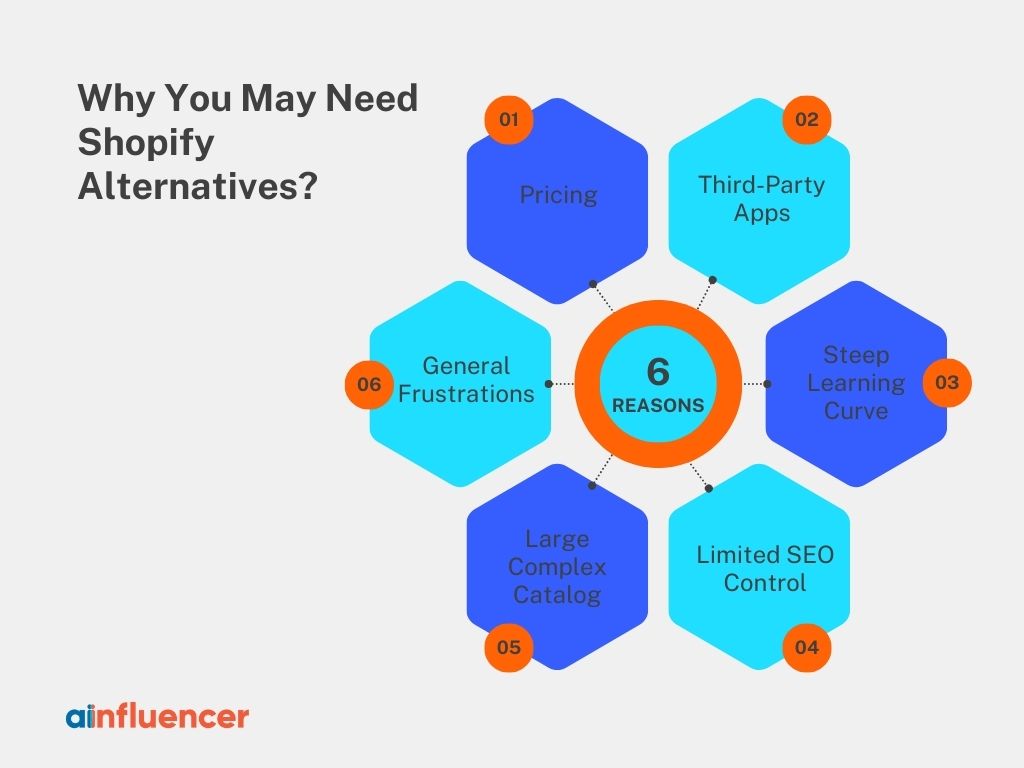In the world of e-commerce platforms, Shopify is highly popular. However, popularity doesn’t always equate to being the best choice, as better options might be available. So, we gather top Shopify alternatives for you.
Your business requirements may vary – you might only need a basic website or robust tools for managing high-volume sales. If you’re seeking a more focused approach to eCommerce marketing, Shopify alternatives are worth exploring. In this article, we’ll give you a list of alternatives to Shopify so you can choose the free Shopify alternatives that suit your business best.
Let’s get started!
What Is Shopify?
Shopify is an eCommerce platform for creating and managing online stores and boosting your brand awareness. It helps you build a website, handle products and orders, process payments, calculate shipping rates, and sell on various platforms. Since it’s a cloud-based service (also called SaaS), you don’t need to worry about maintaining the software.
Shopify serves both small businesses and big enterprises with its different plans. For small businesses, there are three pricing levels – Basic, Shopify, and Advanced – each offering various features.
On the other hand, Shopify Plus is designed for large businesses. It comes with custom pricing, offering advanced features suitable for high-volume stores. Although there isn’t a free plan, Shopify provides Shopify Lite for those who just want to add a buy button to their existing website or blog.
Let’s take a look at some reasons you may look for Shopify or Shopify plus alternatives!
Read Also: How To Boost Your Shopify Sales With Influencer Marketing
Why You May Need Shopify Alternatives?
Now that we understand the basics let’s explore reasons you might want to consider using alternatives to Shopify for your online marketing.

#1 Pricing
If you prefer choosing your payment gateway without extra charges, Shopify’s own payment service may not be the best option. Regardless of your pricing plan on Shopify, you’ll face additional transaction fees if you use a payment provider other than Shopify Payments.
Moreover, the Shopify Payments system is only available in some countries. In addition, when using Shopify, you’ll need to pay fees to process credit card payments. Even if you upgrade to a pricier plan, you’ll still have to pay these fees, although they are lower.
Lastly, many apps in Shopify’s marketplace come with additional charges, so it’s crucial to consider these expenses when seeking advanced features like advanced order tracking and marketing capabilities.
This may lead you directly to the cheaper alternatives to Shopify.
#2 Third-Party Apps
While many successful Shopify stores rely on apps, there’s a downside. Why is that a problem? The costs of these apps can add up quickly, and some may cause conflicts or slow down your store. Installing apps also risks encountering rogue or problematic ones, potentially harming your store or customer experience.
#3 Steep Learning Curve
Despite Shopify claiming to be user-friendly, there is a learning curve. The demand for tutorials and guides indicates that it might be more complex than advertised. If you’re looking for a simple way to start selling products without complications, Shopify might not be the ideal solution.
#4 Limited SEO Control
While Shopify handles basic SEO well, you might desire more control, especially if your eCommerce business heavily relies on organic search. This SEO service limits your ability to access and edit robot.txt files, which are essential for guiding search engines, such as Google, on how to index your website. As your website grows, you may need more influence over how search engines crawl and index your pages.
#5 Large Complex Catalog
If your store has a diverse range of products with various options, such as sizes, colors, designs, and categories, Shopify’s limitations might become apparent. With a cap of 100 SKUs per product and only three options per product, managing a large and intricate catalog could be challenging.
#6 General Frustrations
If you’re dissatisfied with any aspect of Shopify, whether it’s the design of the Help Center, customer support, or concerns based on others’ negative experiences, exploring alternative e-commerce platforms can provide you with different options to address your frustrations.
Regardless of the challenges you’re dealing with on Shopify, it’s essential to choose a new platform that solves those issues.
Read Also: Shopify Collabs Review
Top 5 Shopify Alternatives (Free & Paid)
This list doesn’t cover every option out there, like Volusion, Weebly, or OpenCart, but it highlights some of the best alternatives to Shopify available now.
1. WooCommerce: Free Shopify Alternative for WordPress Websites
If you use or consider using WordPress, you should check out this platform. The WooCommerce plugin makes adding an online store to your website or blog easy. With WordPress, you have lots of design options to choose from, and you can customize them. This gives you more flexibility compared to Shopify.
Plus, you can host your site independently, giving you more control over your online space. WooCommerce is free, open-source, and well-regarded for providing a great experience for visitors. Some people even say it’s better than Shopify in many ways.
Let’s check out its pros and cons!
WooCommerce Pros
- You can use it for free and have complete control over your content.
- You get to pick a payment method with low fees.
- You can add extra features using lots of free plugins.
- You can benefit from WordPress’s strong foundation for marketing and SEO.
- No extra charges for transactions.
- It smoothly integrates with WordPress.
- You will enjoy various features for maximum creativity.
- Post purchases with one-click upsells after a sale.
- It’s really easy to set up.
- You’re free to sell as many products as you want.
- It gives you access to a wide range of free and premium extensions.
WooCommerce Cons
- You don’t get hosting for free with this plugin.
- Even though the plugin itself is free, you have to pay for things like domain hosting, an SSL certificate, and finding an email provider.
- If you’re unfamiliar with HTML or CSS, you might need a dedicated developer or designer to get the most out of your online store.
- You’ll need to use plugins to add essential features to WooCommerce, which can make your site more complicated and slower.
- You’ll need technical skills to manage everything, and the system might be a bit awkward.
- If you don’t choose a good WooCommerce host, your hosting might be slow.
WooCommerce Pricing
- Woo Express:
Price: $25/month (billed annually)
- Custom Hosting Plans:
Cost: Variable
Hosting options range from as low as $3.99 per month to as high as $5,000 per month.
- Domain Registration:
Cost: $15 on average
- Ecommerce and WooCommerce Themes:
Cost: $0 – $100 per year
Paid themes typically range from $20 to $100 per year.
- Shipping Extensions (Optional):
WooCommerce Shipping (Basic): Free
Table Rate Shipping: $119/yr.
ShipStation for WooCommerce: A ShipStation plan is required starting at $9.99/mo.
Distance Rate Shipping: $99/yr.
According to their website, all costs are approximate and subject to variations based on hosting providers, domain registrars, and extensions chosen.
2. BigCommerce: Shopify Alternative for High-Volume Businesses
BigCommerce stands out as a robust alternative to Shopify. It operates similarly but has many built-in features, reducing the need for additional apps. This can lead to cost savings on app expenses. BigCommerce’s one-page checkout is popular for simplifying the buying process and reducing abandoned carts.
Although BigCommerce may be challenging to use initially, it can be better for fast growth. Unlike Shopify, BigCommerce provides unlimited staff accounts with all pricing plans. Now, let’s look at its advantages and disadvantages.
BigCommerce Pros
- All plans come with built-in solid features.
- Supports over 55 payment gateways with no extra fees.
- The drag-and-drop visual editor, Page Builder, is easy to use without requiring coding skills.
- It has omnichannel selling ability, including an in-app checkout for Instagram.
- It offers extensive SEO options, including customizable URLs.
- It boasts an extensive network of Agency and Technology Partners.
BigCommerce Cons
- There are only five free themes, contrasting with Shopify’s nine.
- There is a steep learning curve.
- Pricing might need to be clarified for new users.
- Setting up the platform is challenging.
- It needs to have consistent speed.
- It lacks the feature of one-click post-purchase upsells.
BigCommerce Pricing
- Standard Plan: $39 per month (Billed Annually).
- Plus Plan: $79 per month (Billed Annually).
- Pro Plan: $299 per month (Billed Annually).
- Enterprise Plan: Custom pricing.
3. Wix: Shopify Alternative for Small Business & DIY Sellers
Wix is becoming increasingly popular because it’s one of the easiest and most user-friendly website builders. Wondering why Wix is considered one of the best Shopify alternatives? It’s because Wix provides excellent tools and themes for building eCommerce stores. You might be surprised at how easily you can customize your store on Wix. It is so flexible in customization compared to Shopify.
They are quite flexible when it comes to features and costs. However, even with their priciest recommended Business plan, there’s still a limit of 100 GB for storage. It might not be a problem for everyone, but it could be for some.
Lastly, because Wix is not exclusively designed for online stores, you might find it may be challenging to figure out their tools and features at the beginning.
Wix Pros
- Wix’s Help Center is well-organized and easy to search.
- Wix has fantastic free website themes.
- You can use Wix for free with ads.
- Each premium eCommerce plan includes a free domain for one year.
Wix Cons
- Wix doesn’t support Apple Pay or Amazon Payments.
- There’s no chat support; you need to call or submit a ticket.
- Searching the app store can be challenging due to the variety of non-e-commerce website options Wix offers.
- Wix may be better for focusing on SEO.
- It doesn’t offer as many apps as Shopify.
Wix Pricing
- Business Elite: €177.31/mo
- Business: €34.51/mo
- Core: €23.80/mo
- Light: €11.90/mo
4. SquareSpace: Shopify Alternatives for Website Building
It’s one of the Shopify alternatives for drop-shipping. If you don’t have many products for your dropshipping business, Squarespace might be a good choice. It is a great tool for building websites and has various templates. You can easily create a professional store with its drag-and-drop feature.
Squarespace, an alternative to Shopify, comes with marketing tools like AdWords, MailChimp, and Amazon Affiliate monitoring. Known for its excellent design, Squarespace offers stylish and customizable dropshipping store templates. But The platform also loads slower than Shopify, especially on mobile devices.
Squarespace Pros
- It is a great choice for small dropshipping stores.
- It’s easy to set up with no need for coding skills.
- It comes with a variety of stylish themes.
- You can use your own product photos and templates.
- It offers a wide range of stunning templates for a visually appealing store.
Squarespace Cons
- It needs marketing tools.
- There are restrictions on third-party apps.
- It has limited payment options.
- There is no integrated add-on marketplace.
- It’s unable to track store visits with tracking code API.
Squarespace Pricing
- Personal: €11/mo
- Business: €17/mo
- Commerce BASIC: €24/mo
- Commerce ADVANCED: €36/mo
5. Ecwid: Free Shopify Alternative
Here’s a simple explanation of what Ecwid does: it lets you sell things on your website without needing to change a lot. There are some reasons why people prefer Ecwid over Shopify.
For example, Ecwid doesn’t charge extra fees for transactions; it works well on mobile phones, and you can manage everything using just your phone. Plus, Ecwid is generally cheaper than Shopify.
However, there are some downsides to using Ecwid. Shopify is better when it comes to search engine optimization (SEO) for dropshipping. Also, Ecwid doesn’t give you as much freedom to customize your online store.
But, if you’re willing to spend more, Ecwid’s most expensive plan is great and still costs less than Shopify’s most expensive plan.
Ecwid Pros
- It’s easy to use.
- It offers affordable plans.
- It will adapt quickly to your website’s look.
- There are no transaction fees with Ecwid.
- It has great customer support.
Ecwid Cons
- It offers limited customization options.
- There are Free plan restrictions.
- It’s not very SEO-friendly and lacks features.
- It has limited support for third-party tools.
Ecwid Pricing
It offers a free plan and three paid plans, including:
- Venture: €14,08/mo (Billed annually) or €19 month-to-month.
- Business: €29,08/mo (Billed annually) or €39 month-to-month.
- Unlimited: €82,50/mo (Billed annually) or €99 month-to-month.
Read Also: Best Shopify Apps
Features You Should Consider on Shopify Alternatives
Consider these things when choosing your next online store platform:
- Payment Options: Make sure the platform supports various ways to pay. People have different preferences, like using Visa or PayPal. Look for platforms with multiple payment gateways and consider the potential for international transactions.
- Customization: Your business is unique, so choose a platform that lets you customize it to match your style and needs. Whether you’re a coding pro or not, find a platform that allows easy changes. Consider factors like adding non-text elements or rearranging pictures and videos.
- Scalability: Think about the future. Even if your catalog is small now, consider a platform that can grow with your business. Anticipate growth and ensure the platform can handle new technologies you might implement.
After identifying your preferences, explore alternatives to Shopify that offer these features for your next online store platform.
To Wrap Things Up
Only some businesses find Shopify suitable, and that’s okay. Many other online store platforms can help you establish and expand your business. In this article, we’ve provided a list of the best Shopify alternatives. Just consider the key features you require, like various payment options, low transaction fees, live inventory tracking, drop-shipping setup, or an easy-to-use interface. Then, test and assess each platform before choosing it as your next platform.
FAQs
Shopify’s SEO is quite basic, and our recent research shows that it performs average compared to platforms like WooCommerce. However, you can still achieve SEO success with a Shopify store by implementing a comprehensive strategy to make your online store easily discoverable by potential customers. Check out our list of the best platforms for SEO.
Yes, WooCommerce is one of the free Shopify alternatives. It’s a rare eCommerce solution offering a completely free plan. It’s an open-source plugin that lets you create a website similar to expensive carts without costing you.
Shopify’s pricing reflects the value it provides. Many businesses find the return on investment in terms of time saved and increased sales due to the platform’s robust features.
![You are currently viewing Best Shopify Alternatives in 2024: [Free & Paid]](https://blog.ainfluencer.com/wp-content/uploads/2024/01/featured.jpg)






![Read more about the article How to Become a Fashion Nova Ambassador: [The Ultimate Guide + Best Alternative in 2024]](https://blog.ainfluencer.com/wp-content/uploads/2023/12/Fashion-Nova-ambassador-featured-1-300x182.jpg)

![Read more about the article What Is Temu Influencer Program: [How to Join + Best 2024 Alternative]](https://blog.ainfluencer.com/wp-content/uploads/2024/01/temu-featured-1-300x182.jpg)